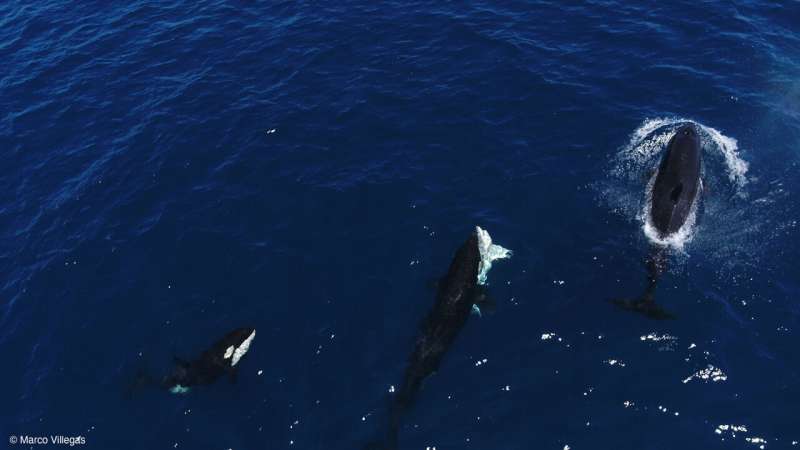Science
Orcas Capture Young Great Whites in Gulf of California

A specialized pod of orcas has been observed hunting young great white sharks in the Gulf of California, marking a significant shift in predator-prey dynamics. The orcas, known as **Moctezuma’s pod**, have displayed a unique hunting technique, flipping these juvenile sharks upside down to consume their nutrient-rich livers. This behavior suggests that orcas may be adapting to changes in their environment, potentially due to warming waters that affect shark nursery areas.
The findings come from a study published in **Frontiers in Marine Science**, led by marine biologist **Erick Higuera Rivas**. According to Rivas, the orcas’ ability to hunt great white sharks highlights their advanced intelligence and social learning. The specific hunting method, which involves inducing a state called tonic immobility in the sharks, allows the orcas to effectively immobilize their prey.
Details of the Hunt
Researchers documented two distinct hunts involving the orcas, resulting in the death of three juvenile great white sharks. The first event occurred in **August 2020**, when five orcas successfully coordinated to catch a juvenile shark. They pushed the shark to the surface, flipped it upside down, and subsequently extracted its liver. A similar event took place in **August 2022**, with the orcas targeting another juvenile shark in the same manner.
This hunting strategy induces a temporary paralysis in the shark, making it defenseless against the orcas. Rivas explained that this technique minimizes the risk of injury to the orcas, which could occur if they attempted to capture larger, more experienced sharks.
Dr. **Salvador Jorgensen**, a co-author of the study from **California State University**, emphasized that this behavior is unprecedented. While adult white sharks are adept at evading predators, juvenile sharks may lack the experience or instinct to escape, making them vulnerable to the orcas.
Environmental Factors and Future Research
The changing distribution of great white sharks in the Pacific Ocean may have provided Moctezuma’s pod with new hunting opportunities. Climate phenomena, such as **El Niño**, have altered the locations of shark nurseries, potentially increasing the presence of juvenile sharks in the Gulf of California. As a result, these young sharks could become seasonal targets for the orcas.
Despite these observations, researchers acknowledge that further studies are necessary to determine the frequency with which orcas hunt white sharks and whether they prefer juveniles during specific seasons. Dr. **Francesca Pancaldi**, a co-author from the **Instituto Politécnico Nacional**, noted that while the current data shows a focus on elasmobranchs, the full dietary habits of Moctezuma’s pod remain unclear.
Understanding the feeding behaviors of orcas in this region is critical for conservation efforts. Identifying their primary habitats can help in creating protected areas and management plans to mitigate human impact on these marine ecosystems.
This groundbreaking study opens new avenues for research into the complex interactions between apex predators and their prey in changing ocean environments. Further investigation will provide insight into the ecological implications of these hunting behaviors and the adaptability of orcas in the face of environmental change.
-

 Science3 weeks ago
Science3 weeks agoIROS 2025 to Showcase Cutting-Edge Robotics Innovations in China
-

 Politics3 weeks ago
Politics3 weeks agoJudge Considers Dismissal of Chelsea Housing Case Citing AI Flaws
-

 World3 weeks ago
World3 weeks agoBravo Company Veterans Honored with Bronze Medals After 56 Years
-

 Lifestyle3 weeks ago
Lifestyle3 weeks agoStone Island’s Logo Worn by Extremists Sparks Brand Dilemma
-

 Health3 weeks ago
Health3 weeks agoStartup Liberate Bio Secures $31 Million for Next-Gen Therapies
-

 Top Stories3 weeks ago
Top Stories3 weeks agoIndonesia Suspends 27,000 Bank Accounts in Online Gambling Crackdown
-

 Health3 weeks ago
Health3 weeks agoTop Hyaluronic Acid Serums for Radiant Skin in 2025
-

 Sports3 weeks ago
Sports3 weeks agoMel Kiper Jr. Reveals Top 25 Prospects for 2026 NFL Draft
-

 World3 weeks ago
World3 weeks agoHoneywell Predicts Record Demand for Business Jets Over Next Decade
-

 Lifestyle3 weeks ago
Lifestyle3 weeks agoMary Morgan Jackson Crowned Little Miss National Peanut Festival 2025
-

 Sports3 weeks ago
Sports3 weeks agoYamamoto’s Mastery Leads Dodgers to 5-1 Victory in NLCS Game 2
-

 Science3 weeks ago
Science3 weeks agoArizona State University Transforms Programming Education Approach









